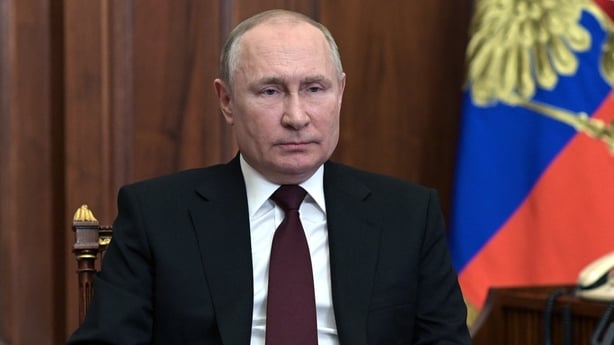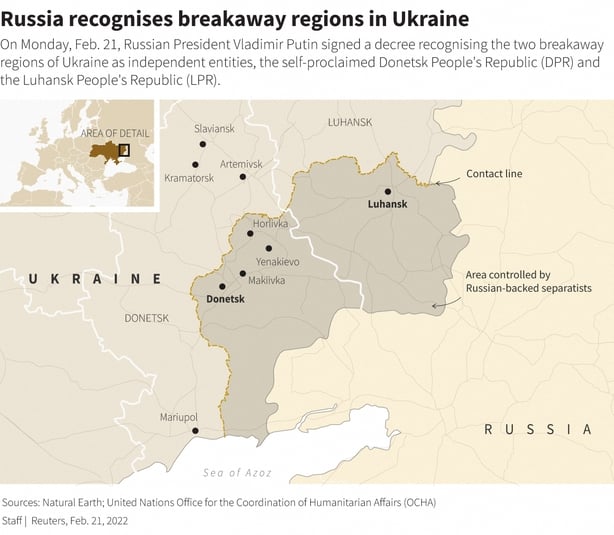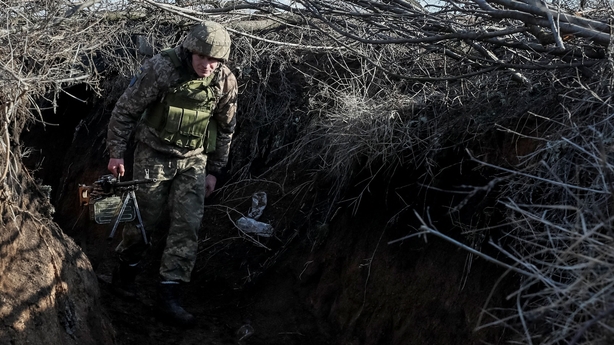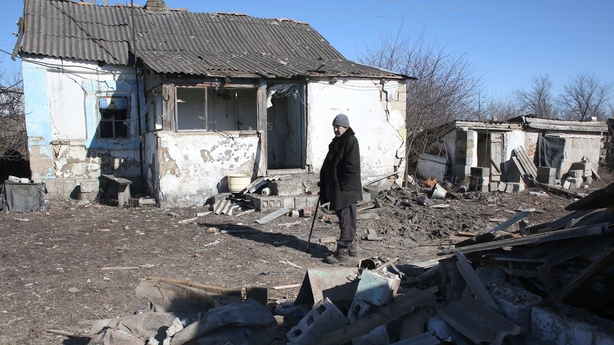Russian President Vladimir Putin has signed a decree recognising two breakaway regions in eastern Ukraine as independent entities, upping the ante in a crisis the West fears could unleash a war.
Mr Putin has ordered Russia's military to act as peacekeepers in the Donetsk and Luhansk regions.
In a lengthy televised address, he described Ukraine as an integral part of Russia's history and said eastern Ukraine was ancient Russian lands and that he was confident that the Russian people would support his decision.
Moscow has provided no details or date for any deployment to the regions, with the order saying only that it "comes into force from the day it was signed".
Mr Putin announced his decision in phone calls to the leaders of Germany and France, who voiced disappointment, the Kremlin said, and was later shown on state television signing the decree.

Moscow's move could torpedo a last-minute bid for a summit with US President Joe Biden to prevent Russia from invading Ukraine.
Mr Putin delivered a long televised address that ended with his announcement, delving into history as far back as the Ottoman empire and as recent as the tensions over NATO's eastward expansion - a key irritant for Moscow in the present crisis.

"I deem it necessary to make a decision that should have been made a long time ago - to immediately recognise the independence and sovereignty of the Donetsk People's Republic and the Luhansk People's Republic," Mr Putin said.
Mr Putin has for years worked to restore Russia's influence over nations that emerged after the collapse of the Soviet Union, with Ukraine holding an important place in his ambitions.
Russia denies any plan to attack its neighbour, but it has threatened unspecified "military-technical" action unless it receives sweeping security guarantees, including a promise that Ukraine will never join NATO.
Mr Putin had said earlier that "if Ukraine was to join NATO it would serve as a direct threat to the security of Russia."
Recognition of the rebel-held areas could pave the way for Moscow to send military forces into the two separatist regions - Donetsk and Luhansk - openly and argue that it is intervening as an ally to protect them against Ukraine.
Read more:
'Dark sign' things in Ukraine moving in wrong direction
What will Russian recognition of breakaway Ukraine regions mean?
Donetsk and Lugansk: Ukraine's breakaway republics
We need your consent to load this rte-player contentWe use rte-player to manage extra content that can set cookies on your device and collect data about your activity. Please review their details and accept them to load the content.Manage Preferences
A Russian parliament member and former Donetsk political leader, Alexander Borodai, has said that the separatists would then look to Russia to help them wrest control of the parts of the two regions that are still under the sway of Ukrainian forces.
This evening, an European Union official said the recognition of the independence of Ukraine's breakaway regions is just a first step after which more action from Russia is likely to follow.
"We know that what Putin decided today is the first step, and there will probably be next steps, so the situation may evolve by the hour," the official said.
Asked if the EU would respond with sanctions already tomorrow, the official said they were likely to take longer, because the EU would want to see Russia's next steps first.
Any sanctions would be prepared by a meeting of ambassadors of EU countries to the European Union, the official said.
Meanwhile, the United States has announced financial sanctions against rebel territories in eastern Ukraine freshly recognised by Russia and warned that more were ready if necessary.
President Joe Biden will issue an executive order to "prohibit new investment, trade, and financing by US persons to, from, or in the so-called DNR and LNR regions of Ukraine," White House Press Secretary Jen Psaki said, referring to the breakaway regions of Donetsk and Lugansk.
The order will "provide authority to impose sanctions on any person determined to operate in those areas of Ukraine," Ms Psaki said, adding that the measures are separate from wider Western sanctions ready to go "should Russia further invade Ukraine."
The EU earlier warned of sanctions from the 27-nation bloc should Moscow annex or recognise the breakaway regions.
"If there is annexation, there will be sanctions, and if there is recognition, I will put the sanctions on the table and the ministers will decide," the EU's foreign policy chief Josep Borrell said after a meeting of the bloc's foreign ministers.
The decision to recognise Donetsk and Luhansk in eastern Ukraine was an "ill omen" and a flagrant breach of international law, British Prime Minister Boris Johnson said.
At a Downing Street press conference he said: "This is plainly in breach of international law, it's a flagrant violation of the sovereignty and integrity of Ukraine.
"It is a repudiation of the Minsk process and the Minsk Agreements.
"I think it's a very ill omen and a very dark sign."
It said it was "yet another indication that things are moving in the wrong direction in Ukraine".
Russia's decision to recognise Ukraine breakaway regions as independent is a "dark sign" things are moving in the wrong direction, says British Prime Minister Boris Johnson | Read more: https://t.co/aGh7PYSin8 pic.twitter.com/47ioDSjMVC
— RTÉ News (@rtenews) February 21, 2022
On Twitter, Minister for Foreign Affairs Simon Coveney said it was a 'very negative development".
Very negative development. Effectively means Russia is abandoning the Minsk Agreement. https://t.co/xcYFO0pbzv
— Simon Coveney (@simoncoveney) February 21, 2022
In a televised address, Mr Putin said the situation in eastern Ukraine is "critical" and described the region as "ancient Russian lands".
He said Ukraine was not able to achieve a stable statehood and has therefore had to rely on foreign countries like the United States.
He said Ukraine is managed by foreign powers, which affects all levels of authorities.
Separately, Moscow said Ukrainian military saboteurs had tried to enter Russian territory in armed vehicles leading to five deaths, an accusation dismissed as "fake news" by Kyiv.
Both developments fit a pattern repeatedly predicted by Western governments, who accuse Russia of preparing to fabricate a pretext to invade Ukraine by blaming Kyiv for attacks and relying on pleas for help from separatist proxies.
Recognition by Moscow of the rebel regions' independence will narrow the diplomatic options to avoid war, since it is an explicit rejection of a seven-year-old ceasefire mediated by France and Germany, touted as the framework for future negotiations on the wider crisis.
Hours earlier, French President Emmanuel Macron gave hope of a diplomatic solution, saying Mr Putin and Mr Biden had agreed in principle to meet.
But the Kremlin said there were no specific plans for a summit. The White House said Mr Biden had accepted the meeting "in principle" but only "if an invasion hasn't happened".

In Washington, President Joe Biden summoned his top security advisers. Secretary of State Antony Blinken, Defense Secretary Lloyd Austin and General Mark Milley, chairman of the US Joint Chiefs of Staff, could be seen entering the White House on the President's Day holiday.
Washington says Russia has amassed a force numbering 169,000-190,000 troops in the region, including the pro-Russian rebels in the breakaway regions in eastern Ukraine, and could invade within days.
Earlier, officials said a Ukrainian civilian died in a shelling attack on a government-held village, with the incident coming as fears were rising of an imminent Russian invasion.
Local officials said the civilian was killed in an attack on Novoluganske, a settlement 35km north of Donetsk.
European financial markets tumbled at the signs of increased confrontation, after having briefly edged higher on the glimmer of hope that a summit might offer a path out of Europe's biggest military crisis in decades.
The rouble extended its losses as Mr Putin spoke on the issue, falling 3.3% on the day to 79.83 per dollar.

Russia has lists of Ukrainians 'to be killed' - US
Meanwhile, the US has warned the UN it has information that Russia has lists of Ukrainians "to be killed or sent to camps" in the event of an invasion, according to a letter sent to the UN rights chief and obtained by AFP.
The letter says the United States is "deeply concerned" and warns of a potential "human rights catastrophe."
The United States has "credible information that indicates Russian forces are creating lists of identified Ukrainians to be killed or sent to camps following a military occupation," the letter says.
"We also have credible information that Russian forces will likely use lethal measures to disperse peaceful protests or otherwise counter peaceful exercises of perceived resistance from civilian populations," says the message, addressed to UN High Commissioner for Human Rights Michelle Bachelet.
The note, signed by Bathsheba Nell Crocker, US ambassador to the UN in Geneva, warns a Russian invasion of Ukraine could bring with it abuses such as kidnappings or torture, and could target political dissidents and religious and ethnic minorities, among others.

